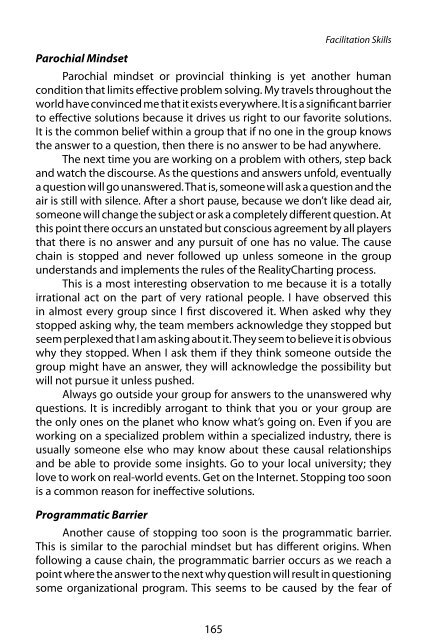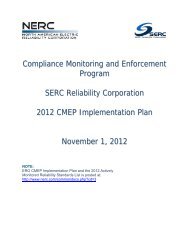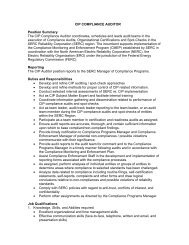RealityCharting e-book .pdf - SERC Home Page
RealityCharting e-book .pdf - SERC Home Page
RealityCharting e-book .pdf - SERC Home Page
- No tags were found...
You also want an ePaper? Increase the reach of your titles
YUMPU automatically turns print PDFs into web optimized ePapers that Google loves.
Parochial Mindset<br />
Facilitation Skills<br />
Parochial mindset or provincial thinking is yet another human<br />
condition that limits effective problem solving. My travels throughout the<br />
world have convinced me that it exists everywhere. It is a significant barrier<br />
to effective solutions because it drives us right to our favorite solutions.<br />
It is the common belief within a group that if no one in the group knows<br />
the answer to a question, then there is no answer to be had anywhere.<br />
The next time you are working on a problem with others, step back<br />
and watch the discourse. As the questions and answers unfold, eventually<br />
a question will go unanswered. That is, someone will ask a question and the<br />
air is still with silence. After a short pause, because we don’t like dead air,<br />
someone will change the subject or ask a completely different question. At<br />
this point there occurs an unstated but conscious agreement by all players<br />
that there is no answer and any pursuit of one has no value. The cause<br />
chain is stopped and never followed up unless someone in the group<br />
understands and implements the rules of the <strong>RealityCharting</strong> process.<br />
This is a most interesting observation to me because it is a totally<br />
irrational act on the part of very rational people. I have observed this<br />
in almost every group since I first discovered it. When asked why they<br />
stopped asking why, the team members acknowledge they stopped but<br />
seem perplexed that I am asking about it. They seem to believe it is obvious<br />
why they stopped. When I ask them if they think someone outside the<br />
group might have an answer, they will acknowledge the possibility but<br />
will not pursue it unless pushed.<br />
Always go outside your group for answers to the unanswered why<br />
questions. It is incredibly arrogant to think that you or your group are<br />
the only ones on the planet who know what’s going on. Even if you are<br />
working on a specialized problem within a specialized industry, there is<br />
usually someone else who may know about these causal relationships<br />
and be able to provide some insights. Go to your local university; they<br />
love to work on real-world events. Get on the Internet. Stopping too soon<br />
is a common reason for ineffective solutions.<br />
Programmatic Barrier<br />
Another cause of stopping too soon is the programmatic barrier.<br />
This is similar to the parochial mindset but has different origins. When<br />
following a cause chain, the programmatic barrier occurs as we reach a<br />
point where the answer to the next why question will result in questioning<br />
some organizational program. This seems to be caused by the fear of<br />
165
















